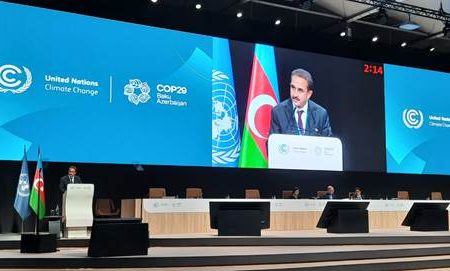Baku, Azerbaijan: Delivering India’s national statement at the High-Level Segment of the CoP29 of the UN Climate Change Conference, Union Minister for Environment, Forest, and Climate Change, Kirti Vardhan Singh, emphasized the historic nature of the conference and called for a united global effort to combat climate change under the framework of the UNFCCC and its Paris Agreement.
“This CoP is historic as it will shape actions that particularly impact the Global South,” said Singh. He urged nations to base their decisions on the principles of equity, climate justice, and common but differentiated responsibilities and respective capabilities. These principles, he noted, must account for diverse national circumstances, sustainable development goals, and the imperative of poverty eradication.
Singh underscored the unequal burden of climate action borne by the Global South, highlighting that the historic carbon emissions of the Global North have left limited carbon space for developing countries. He emphasized that while nations in the Global South, including India, are disproportionately impacted by climate change, their commitment to sustainable development and ambitious climate actions remains steadfast.
The Minister outlined India’s significant progress in combating climate change. He noted that India achieved its 2015 Nationally Determined Contributions (NDC) targets for reducing emission intensity and expanding non-fossil-based electricity generation well ahead of the 2030 deadline. India’s renewable energy capacity has nearly tripled since 2014, and the nation is on track to achieve its target of 500 GW by 2030.
Singh highlighted India’s global initiatives, such as the Mission LiFE (Lifestyle for Environment), which promotes sustainable lifestyle practices worldwide, and the “Ek Ped Maa ke Naam” campaign, through which one billion saplings have been planted to honor Mother Earth. Other key initiatives include the International Solar Alliance, Coalition for Disaster Resilient Infrastructure (CDRI), Global Biofuel Alliance, and several partnerships for resource efficiency and circular economy.
Raising concerns about unilateral measures by developed nations that hinder climate actions in the Global South, Singh called for breaking barriers to the flow of green technologies, finances, and capacity building. He emphasized the urgency of mobilizing climate finance through the New Collective Quantified Goals (NCQG) to meet the needs and priorities of developing countries, making CoP29 a pivotal “CoP for Climate Finance.”
India’s statement also underscored the importance of developed countries advancing their net-zero targets and providing adequate carbon space for developing nations. Shri Singh stressed that the decisions made at CoP29 must reflect ambition and clarity, addressing the evolving needs of developing nations while supporting their sustainable development and poverty eradication goals.
“What we decide here will determine the course of history,” Singh remarked, urging all nations to work with determination towards meaningful and impactful outcomes. He reiterated India’s commitment to global climate goals and pledged full cooperation for a successful CoP29.

